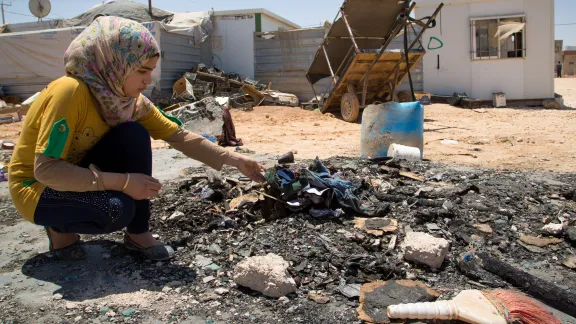
A young woman in Zaâatari camp, Jordan. Photo: LWF/ M. de la Guardia
Statement to Brussels conference on Statement to Brussels conference on ‘Supporting the future of Syria and the region’
(LWI) “Some of the most powerful and influential governments meet today to discuss the future of Syria. While we welcome international engagement on Syria, we want to register our grave concern that refugee returns and reconstruction are being discussed prematurely, while civilians and what remains of their homes, hospitals, schools and bakeries remain under attack,” says a statement signed by The Lutheran World Federation (LWF) and a number of other aid agencies and coordination fora working in the region and with Syrian refugees.
The briefing is aimed at the conference on ‘Supporting the future of Syria and the region’ from 4-5 April 2017 in Brussels, Belgium. It also comes one day after a chemical attack which killed at least 58 people, including infants, in Northern Syria.
Call to protect civilians and ensure right to asylum
“LWF has joined a growing number of agencies asking the ongoing Brussels conference to uphold the rights of civilians fleeing Syria, ensure that refugees have access to help in crossing international borders, protect international aid workers, and provide medical and other assistance for refugees and areas damaged by the conflict,” says Caroline Tveoy, LWF Regional Program coordinator for the Middle East and North Africa.
“In this statement the LWF and other non-governmental organizations are also asking governments taking part in the Brussels conference to recommit to the right to seek asylum and state clearly that current conditions do not meet the needs that would allow voluntary and safe return of refugees to Syria,” Tveoy adds. “Governments should also facilitate aid in border crossings and support humanitarian organizations responding to critical needs in Syria.”
LWF has joined a growing number of agencies asking the ongoing Brussels conference to uphold the rights of civilians fleeing Syria, ensure that refugees have access to help in crossing international borders, protect international aid workers, and provide medical and other assistance for refugees and areas damaged by the conflict.
No forced return to Syria
Stressing the need to follow the approaches outlined at previous conferences on Syria held in London and Helsinki, the NGOs said that while some significant policy changes have improved access to education and economic opportunities for refugees from Syria, “much remains to be achieved.”
“Under no circumstances,” the NGO statement said, should actions “compel refugees to return to Syria.”
The LWF has for several years been involved in programs aiding refugees from Syria, including family-centred protection and psychosocial work, both in the Za’atari camp and in host communities in Jordan, as well as education, vocational training and livelihood, food, shelter and psychosocial support to Syrian refugees in Northern Iraq, and calls to all parties in the conflict to bring an end to the violence and violation of human rights which have occurred during the more than five years of internal warfare.
The Brussels conference, the statement said, “should also set the foundation for inclusive and meaningful participation of Syrian NGOs and civil society, including youth and women’s groups, as key partners” in efforts to meet “the needs and desires of the people of Syria” and support “local community rebuilding and resilience.”
Bureaucracy stops assistance
The agencies also seek expanded medical and mental health aid for people in Syria, and an end to attacks on health care facilities and schools. Many healthcare workers have fled the country, and a third of the nation’s schools are now “out of use due to conflict damage.”
More refugees from Syria should be admitted into wealthy countries, the statement said “with a pledge to increase refugee resettlement to wealthy countries to at least 10 percent of the refugee population from Syria by the end of 2017.”
NGOs working with refugees in Turkey, Jordan, Iraq and Lebanon have faced “bureaucratic” difficulties in registration and visa requirements that have hindered the humanitarian work or the ability to provide goods and services to refugees, the statement said. “The restrictions placed on cross boarder assistance mean that Syrians in desperate need are being denied assistance unnecessarily,” the NGO statement said.


